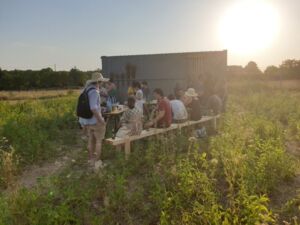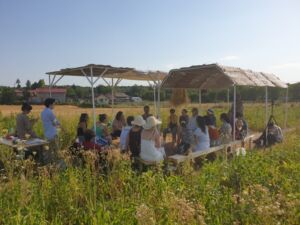The FEINART summer school was already a while ago and as time is passing, thoughts, mindsets, modes and focus shift fast. It does feel quite far away. However, talks and encounters there resonate with me and join the meaningful experiences I have collected during my collaborations this year with the Partner Organisations at FEINART. I had the pleasure of expanding one of the thought-provoking experience I had from this period, in my contribution to the ‘little pieces’ presentations at the summer school. To those who did not have the chance to join us at the conference, here it is:
In the four minutes that I’m granted your attention, I would like to share with you an experience I had with Tranzit Bucharest, an independent socially engaged art organisation, a network member of like initiatives in Romania and more broadly in Centre Eastern Europe.
These days, Tranzit Bucharest has moved its organisation into a container situated in an area that in the future will be geographically considered ‘Greater Bucharest’ (as it will expand) but is now a non-urban, rural, field. Tranzit Bucharest have metamorphosed into ‘The Experimental Station for research on art and life’, which is the stable realisation of an older desire to build a community around values of love for art, respect for nature, friendship, belief in emancipatory practices, the sharing of resources, and mutual trust.

One of the opening events was at the field where the station is located. There, we engaged in a conversation moderated by Adelina Luft, a curator and art manager who had lived in Indonesia for 8 years, and collaborated with Arief Yudi Rahman, an artist and curator who works at the Jatiwangi art factory in Indonesia. The factory is a lumbung member and contributed to Documenta Fifteen with The Rural Agenda – a transnational summit among rural community networks to which policymakers and politicians were invited. The knowledge shared there was around the expanded meaning of sustainability from the perspective of communities from (I quote) “the periphery and below”.
In our conversation with Arief, he described the work of the Jatiwangi factory, which started with a production of roof tiles from a specific type of clay. Over the years, this clay has become the material used by the people of the area to create an identity for the region and raise collective dignity and happiness, the factory transforming itself into a community-based space for contemporary art and social practice.
Such a combination of ‘factory’ and ‘art’ to be brought into a conversation in Romania is intriguing, as in Romanian history there was also a version of art in the factory. Artists were assigned to factories to engage assembly-line workers in arts education, as a part of programmes that were envisioned by the cultural ministries of the communist party to create the culture of a ‘new society’ and to move to the forefront the crucial role that culture plays in society.
You can only imagine the stream of questions that were “tzunamied” to Arief in the attempt to figure out how similar concepts might be manifested so distinctively different.

I think – and this is the main thing I would like to address here – this instance is endemic to the bigger question of the Transferability of practices, such as (for example) the lumbung 1 members, who introduced to Europe and the Global North their versions of friendship, care, and resource sharing. How can we honour such knowledge and attend to the Rural Agenda’s pleas for structural change? How can we avoid a mere integration of rhetoric in a pseudo political change? Such a process, I maintain, requires a ‘learning away’ (inspired by Irit Rogoff’s ‘Looking Away’), that is ‘learning away’ from our institutions and what and how we think we know; not in a dismissive manner, or by brushing-off all former endeavours, but in a way that allows a distilling of knowledges – from the “periphery and below” as well as from modern innovations – into what can be constructive for a sustainable and just future for all that is living and growing.
In reply to the question of what Tranzit Bucharest is planning, now that it has transitioned to the rural, Raluca Voinea, the co-director of the organisation, answered that they’re there with some ideas in mind, but are mostly looking to see what will emerge from the new situatedness. In challenging a normative framework derived from the objective execution of a strategic, prefigured business plan, rural Tranzit Bucharest, already implies a new possibility of ‘learning away.’
*Photos were generously shared by Raluca Voinea.

